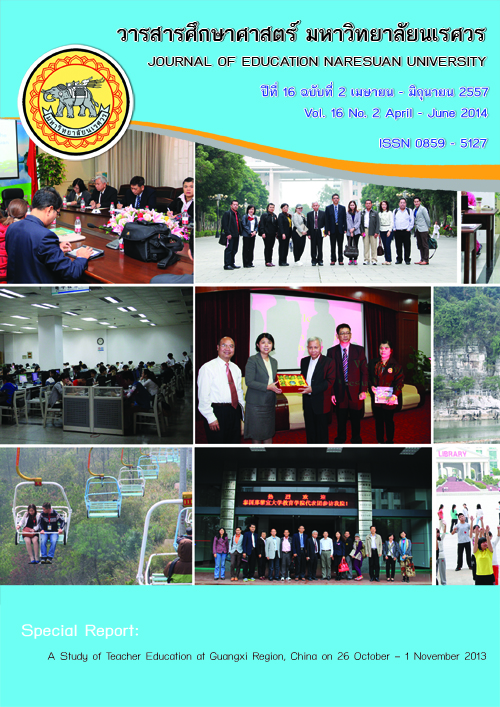การพัฒนารูปแบบการเรียนรู้ตามแนวทฤษฎีคอนสตรัคติวิสต์ด้วยการช่วยเสริมศักยภาพ เพื่อส่งเสริมทักษะกระบวนการทางคณิตศาสตร์ด้านการแก้ปัญหา สำหรับนักเรียนชั้นมัธยมศึกษาปีที่ 1
Main Article Content
Abstract
บทคัดย่อ
การวิจัยในครั้งนี้มีวัตถุประสงค์ 1) เพื่อสร้างและหาคุณภาพของรูปแบบการเรียนรู้ตามแนวทฤษฎีคอนสตรัคติวิสต์ด้วยการช่วยเสริมศักยภาพเพื่อส่งเสริมทักษะกระบวนการทางคณิตศาสตร์ด้านการแก้ปัญหา สำหรับนักเรียนชั้นมัธยมศึกษาปีที่ 1 2) เพื่อทดลองใช้รูปแบบการเรียนรู้ตามแนวทฤษฎีคอนสตรัคติวิสต์ด้วยการช่วยเสริมศักยภาพเพื่อส่งเสริมทักษะกระบวนการทางคณิตศาสตร์ด้านการแก้ปัญหาทางคณิตศาสตร์ สำหรับนักเรียนชั้นมัธยมศึกษาปีที่ 1 โดยศึกษาผลดังนี้ 2.1) เปรียบเทียบทักษะกระบวนการด้านการแก้ปัญหาโดยรูปแบบการเรียนรู้ก่อนและหลังทดลองใช้รูปแบบการเรียนรู้ 2.2) เปรียบเทียบทักษะกระบวนการด้านการแก้ปัญหาของนักเรียนที่เรียนโดยรูปแบบการเรียนรู้หลังการทดลองใช้กับเกณฑ์ 80/80 2.3) ศึกษาพฤติกรรมการแก้ปัญหาทางคณิตศาสตร์ ซึ่งการพัฒนารูปแบบการเรียนรู้ตามแนวทฤษฎีคอนสตรัคติวิสต์ด้วยการช่วยเสริมศักยภาพเพื่อส่งเสริมทักษะกระบวนการทางคณิตศาสตร์ด้านการแก้ปัญหา สำหรับนักเรียนชั้นมัธยมศึกษาปีที่ 1 ดำเนินการโดยประยุกต์ใช้กระบวนการวิจัยและพัฒนา (Research and Development) กับนักเรียนชั้นมัธยมศึกษาปีที่ 1 โดยการคัดเลือกคละความสามารถ เก่ง ปานกลาง อ่อน โรงเรียนสาธิตวิทยาลัยสงฆ์พุทธชินราช สังกัดสำนักงานพระพุทธศาสนาแห่งชาติ ภาคเรียนที่ 2 ปีการศึกษา 2555 เครื่องมือที่ใช้ในการวิจัย ได้แก่ รูปแบบการเรียนรู้ แบบวัดทักษะกระบวนการทางคณิตศาสตร์ด้านการแก้ปัญหาทางคณิตศาสตร์ และการบันทึกผลพฤติกรรมการแก้ปัญหาทางคณิตศาสตร์ของนักเรียน
ผลการวิจัยพบว่า
1. รูปแบบการเรียนรู้ที่พัฒนาคือ รูปแบบการเรียนรู้ตามแนวทฤษฎีคอนสตรัคติวิสต์ด้วยการช่วยเสริมศักยภาพเพื่อส่งเสริมทักษะ กระบวนการทางคณิตศาสตร์ด้านการแก้ปัญหาสำหรับนักเรียนชั้นมัธยมศึกษาปีที่ 1 ที่สร้างขึ้นมีชื่อว่า UCDDE Model มีกระบวนการเรียนรู้ ดังนี้ 1) ขั้นการทำความเข้าใจปัญหา (Understanding : U) 2) ขั้นการสร้างตัวแทนของปัญหา (Constructing : C) 3) ขั้นวางแผนการแก้ปัญหา (Devising : D) 4) ขั้นการปฏิบัติกิจกรรมการแก้ปัญหา (Doing : D) 5) ขั้นการประเมินผลการแก้ปัญหา (Evaluating : E) มีผลการตรวจสอบคุณภาพของรูปแบบการเรียนรู้โดยผู้เชี่ยวชาญ พบว่า รูปแบบการเรียนรู้ที่พัฒนาขึ้นมีคุณภาพอยู่ในระดับมาก ( = 4.32, S.D = 0.69) และมีค่าดัชนีประสิทธิผล (Effectiveness Index E.I.) ระหว่างร้อยละ 60.88 - 67.06 ซึ่งสูงกว่าเกณฑ์ร้อยละ 50 ทุกบทเรียน
2. ผลการใช้รูปแบบการเรียนรู้ที่พัฒนาขึ้น พบว่า 2.1) นักเรียนมีทักษะกระบวนการทางคณิตศาสตร์ด้านการแก้ปัญหาหลังเรียนสูงกว่าก่อนเรียนอย่างมีนัยสำคัญทางสถิติที่ระดับ.01 2.2) นักเรียนมีทักษะกระบวนการทางคณิตศาสตร์ด้านการแก้ปัญหาหลังเรียนสูงกว่าเกณฑ์ร้อยละ 80 อย่างมีนัยสำคัญทางสถิติที่ระดับ.01 2.3) นักเรียนมีพฤติกรรมการแก้ปัญหาทางคณิตศาสตร์โดยภาพรวมอยู่ในระดับมาก และการช่วยเสริมศักยภาพทำให้นักเรียนมีพัฒนาการด้านทักษะการแก้ปัญหาทางคณิตศาสตร์ดีขึ้นอย่างเป็นลำดับ
คำสำคัญ : รูปแบบการเรียนรู้/ คอนสตรัคติวิสต์/ การช่วยเสริมศักยภาพ/ทักษะกระบวนการแก้ปัญหาทางคณิตศาสตร์/ การแก้ปัญหา
Abstract
The purpose of this research was to develop a learning model based on constructivist theory of a scaffolding to enhance mathematics problem solving skill for lower secondary students. The research procedure comprised of 2 steps. There were 1) to develop and verify quality of the instructional 2) to implement the learning model. The sample sused for the experiment was one Secondary classroom in satitwittayalaisongbuddhachinnaraj school of secondary of Education of the under national office of buddhism. In the 2nd semester of the 2013 academic year. The sample was drawn by means of mixed – ability: excellent, moderate and low. The research instruments were a multiple – choice test of Mathematical Process Skill on Problem Solving. The test was examined by 5 experts index of congruence was used. The index of congruence was 0.60 up. The sample group used for the experiment were 35 students of Mattayomsuksa 1. To find the quality in terms of discrimination and reliability of discrimination was ranging .25 - .89 and realiability was .92 an essay type of writing ablity on Mathematical Process Skill. The sample group used for the experiment were 35 students of Mattayomsuksa 1 for checking quality checking in terms of reliabilities. The reliability was .92. The statistic data analyses are percentage, mean S.D. and t-test the results was reverated that. 1. The developed model are called UCDDE Model; Under standing: U, Construct: C, Devising: D, Doing : D, Evaluating : E and it had high levels of appropriateness. The effectiveness index (E.I.) were between 60.88 – 67.06 percent showing that the student’s abilities passed above 50 percent minimum criteria. 2. the effect of implementation were : 2.1) the students had mathematical problem solving process skill after learned with the developed model was higher than before at the .01 level of statistical significance. 2.2)the students had mathematical problem solving process skill after learned through the developed model was higher than 80 percent criterion at the .01 level of statistical significance. 2.3) the students had mathematical problem solving behavior in overall at a high level. And scaffolding process help improve the students learning development and mathematical problem solving was improved in a better order.
Key words: Learning Model/ Constructivist/ Scaffolding/ Mathematics Skill/ Problem Solving
Article Details
The owner of the article does not copy or violate any of its copyright. If any copyright infringement occurs or prosecution, in any case, the Editorial Board is not involved in all the rights to the owner of the article to be performed.


